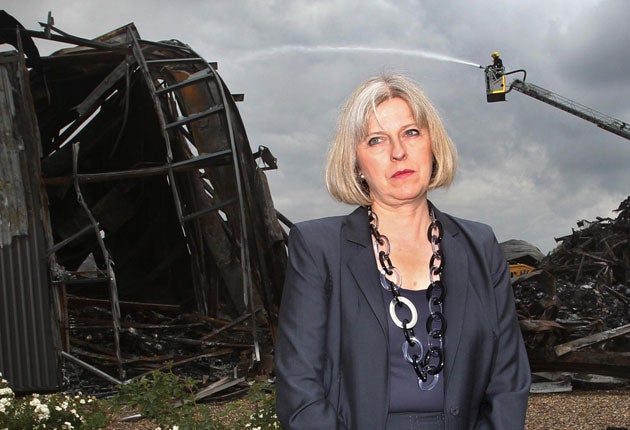Theresa May hits back in riot policing row

Home Secretary Theresa May hit back at senior police chiefs over political criticism of their initial riot response, insisting it was her job to tell forces "what the public want them to do".
Mrs May refused to accept complaints that politicians were overstepping the line after the head of Scotland Yard attacked "extremely hurtful and untrue" claims that police had been timid.
She defended the Government's determination to press ahead with police budget cuts, saying they could be made "without affecting their ability to do the job the public want them to do".
And she defended the decision to recruit US "Supercop" William Bratton as an adviser on tackling gang culture in the UK.
Friction between the police and the Government mounted today with the president of the Association of Chief Police Officers, Sir Hugh Orde, dismissing Mr Bratton's relevance.
And Metropolitan Police Acting Commissioner Tim Godwin complained of "inconsistencies" from Parliament over tactics and spoke of his upset at political criticism of the Met's response.
Mrs May said individual officers had done an "amazing job" in policing the streets during the rioting and looting and said the country owed them an "enormous debt of gratitude".
But she told Sky News Murnaghan programme: "The police and the politicians have different jobs to do here. The police have their operational independence, that's absolutely right.
"It is right that no politician should tell a police officer who to arrest or who to investigate.
"But the minister's job is both to ensure that the police know they have support when they get tough and also, it is my job as Home Secretary, to ensure that the police know what the public want them to do.
"It was clear the public wanted them to get tough. They did that, they changed their tactics and we saw it had an impact."
She said Mr Bratton "has experience and I want to listen to that experience" but added that she also wanted to draw on expert advice from around the world and across Britain.
Mrs May said she would chair a meeting of the Government's emergency committee, Cobra, tomorrow to decide how to proceed.
"We've had a number of calmer nights. I hope that is going to continue and we can start to talk about moving ahead and looking at deployments for the future."
Tensions with the police were raised when Prime Minister David Cameron told MPs that "far too few" officers had been deployed at first and the police tactics "weren't working".
He announced a surge of 16,000 officers to the streets of the capital and said police conceded they made mistakes in treated the violence as public disorder not criminal acts.
Mr Godwin complained about criticism from people "who weren't there" - seen as a dig at the premier who remained on holiday in Italy during the first days of disorder.
And Sir Hugh, seen as a frontrunner to be the next permanent Scotland Yard chief, has been vocal in his criticism, suggesting politicians were irrelevant to the process.
But Mrs May said she and Mr Cameron had driven the change in tactics.
"The Prime Minister and I were very clear about two things: we wanted to see a presence on the streets; we also wanted to see a tough arrest policy. That has been followed through.
"We also want to see swift justice - we are seeing that through the courts - and tough sentences, we are seeing all of that."
Defending budget cuts totalling around 20% in real terms over four years which are predicted to mean the loss of 16,000 officers, she said: "We are continuing with our proposals.
"It is possible to make cuts in police budgets without affecting their ability to do the job the public want them to do and ensuring the police can still provide frontline services."
It meant getting officers "out from their desks and out there on the streets", she said, claiming the support of "most police officers" for the reforms.
Representatives of rank and file officers ridicule ministers' claims that the cuts can be made without reducing the number of officers available to patrol the streets and the budget reductions are also opposed by the Tory Mayor of London Boris Johnson.
The expected arrival of former New York police chief Mr Bratton, now a consultant, at the invitation of Mr Cameron has inflamed tensions with senior officers in this country.
"I am not sure I want to learn about gangs from an area of America that has 400 of them," Sir Hugh told The Independent on Sunday.
Mrs May played down the significance of Mr Bratton's role, saying: "I am going to bring together a group of people internationally - I hope Bill Bratton will be one of those.
"But I am also setting up an 'end gang violence team' which will bring together the police in the UK, local authorities, voluntary sector organisations.
"I want to find out what has been working."
She stressed however, despite hints from Downing Street that it might favour Mr Bratton, that there were "tough crime fighters" within UK forces.
Mrs May said she had asked for courts to be given advice that juveniles convicted of taking part in the rioting and looting should lose their right to anonymity and be named and shamed.
PA
Bookmark popover
Removed from bookmarks